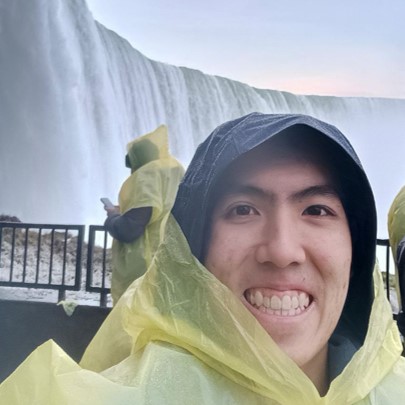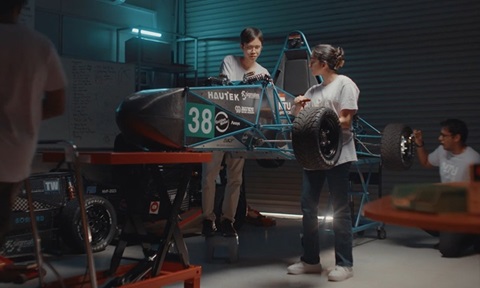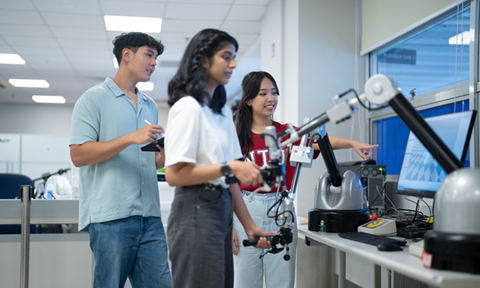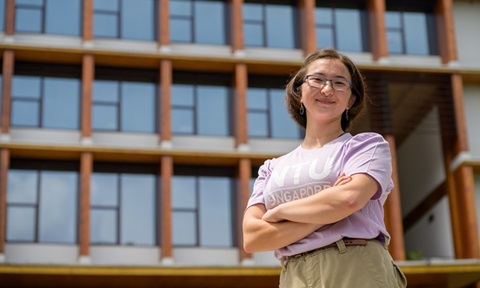On course for greater things
These NTU subjects are placed among the world’s top 10 in the latest Quacquarelli Symonds (QS) subject rankings. Students tell HEY! what drew them to specialise in these fields at NTU, and why they’ve made the right choice
by Kenny Chee and Tan Zi Jie
MATERIALS SCIENCES
2ND IN THE WORLD
“NTU’s standing in materials science is among the best in the world, and I like the university’s focus on hands-on learning. Lab sessions help me better understand and appreciate abstract, theoretical concepts. In one class, I used a microscope to see how adding certain microstructures to a material changed its physical properties, like its toughness – and we tested these properties in the lab too.
I became very interested in semiconductors because of Assoc Prof Tan Kwan Wee. I initially found semiconductors hard to understand, but he made the concepts much easier. He sparked my interest with his lively teaching – like using a crowded bus analogy to explain how semiconductors work, or demonstrating their features with magnets and other equipment.
I’m now keen to join the semiconductor industry. I’ve applied for a Work-Study Degree Programme, which lets me intern at a company in the field and later take on a final-year project with a relevant business.”
Conan Lim
Materials Engineering, Year 2

ELECTRICAL & ELECTRONIC ENGINEERING
4TH IN THE WORLD
“After studying mechatronics in polytechnic, I wanted to pursue a related field. I visited NTU’s Open House and was drawn to the School of Electrical & Electronic Engineering’s (EEE) welcoming culture. I was also wowed by NTU’s high international standing in the field, on top of it offering the best EEE programme in Singapore.
I prefer hands-on learning so I really like the approach of combining theoretical and practical learning, such as studying circuitry theory in lectures before doing lab work in pairs.
During my internship at the Land Transport Authority’s power supply and electrical services division, I worked with some colleagues who are NTU EEE graduates. Their achievements inspired me to specialise in power engineering, which NTU is known for. So I took up modules such as power systems and conversion, and power design.
Dr Eddy Foo, who teaches our power distribution module, makes learning enjoyable. He helps us see the bigger picture beyond the theory, such as by breaking down the costs of power generation to show the association between power engineering and economics.”
Kimberly Suriya
Electrical & Electronic Engineering, Year 4

MECHANICAL, AERONAUTICAL & MANUFACTURING ENGINEERING
4TH IN THE WORLD
“After polytechnic, I wanted to do a mechanical engineering degree and chose NTU because my family and teachers said it’s the top university in Singapore for engineering education. NTU’s high global ranking in the field was the cherry on top.
One of the most valuable experiences so far has been an engineering innovation and design module where we had to design a product that benefits society. My team came up with a mechanically retractable cover to shelter parked motorcycles when it rains, as existing covers tend to be bulky and tedious to fold after use. We had to consider many factors, from product construction methods to project management timelines.
NTU professors help us see the real-world relevance of what we’re learning. For example, Asst Prof Ho Jin Yao connects concepts from heat transfer and thermodynamics to applications in heating, ventilation and air conditioning systems. This helped me understand how refrigerants and cooling systems work – and inspired me to specialise in energy and the environment in my final year, with the aim of working in this field.
Asst Prof Ho also gave helpful advice on the modules that would best prepare me to become a licensed professional engineer. Coincidentally, they are on topics I am already interested in, so things have worked out well for me at NTU.”
Haider Irfan
Mechanical Engineering, Year 3

COMMUNICATION & MEDIA STUDIES
4TH IN THE WORLD
“I chose NTU’s communication programme for its breadth and flexibility, which gave me the freedom to explore different media through practicum classes, school activities, internships and more. Since then, I’ve produced an animated documentary that was screened at local and international festivals, written across different beats, and interned in radio and video production – experiences that shaped me as a creative generalist still finding my niche.
NTU’s overseas opportunities have been life-changing, allowing me to connect deeply with the world. During my exchange semester at the University of Texas at Austin, I studied music journalism and fell in love with it. Last July in Iceland, as part of NTU’s Going Overseas for Advanced Reporting module, I produced a photo story on Icelandic rescue volunteers that was published in The Straits Times and a documentary that won an award overseas.
At NTU, my photojournalism lecturer and final-year project supervisor, Mr Samuel He, has challenged me since day one – from assigning us to cover Singapore’s presidential elections to pushing us with realistic, thoughtful feedback. His support motivates me to try harder and do better. One day, I hope to pass on my passion by teaching future storytellers too.”
Wayne Lim
Communication Studies, Year 4

DATA SCIENCE & ARTIFICIAL INTELLIGENCE
5TH IN THE WORLD
“I’ve always enjoyed mathematics and programming, so NTU’s Data Science & Artificial Intelligence (AI) programme suits me perfectly. When I applied in 2020 – before completing my National Service – it was a new course and the first batch hadn’t graduated. I’m glad that it’s now one of the most reputable AI courses in the world, according to a Forbes ranking, and that NTU’s global standing in AI has grown even stronger since then.
Right now, I’m interning as an AI engineer with a public agency, testing large language and deep learning models to support home team operations. It’s exciting to see agencies, like the police force, actively using the tools even as we improve them in real time. Modules I took at NTU in database systems and software engineering gave me a solid foundation to pick things up quickly on the job.
In my second year, I joined an interdisciplinary research project done with Imperial College London. We explored how students felt about the collection and use of their learning data, sharing insights across both our campuses. While finalising our findings, I mostly used Python for data analysis, but my teammates from NTU Psychology brought in perspectives I hadn’t considered – like how a student’s background could shape their responses. It reminded me that data isn’t just black and white, but layered with human complexity.”
Dominic Lai
Data Science & Artificial Intelligence, Year 3

COMPUTER SCIENCE & INFORMATION SYSTEMS
6TH IN THE WORLD
“I discovered my passion for software development while studying IT in polytechnic. Wanting to become a well-rounded developer and problem solver, I applied to NTU because of its strong reputation in computer science. I hoped to gain a solid foundation in core computing principles like algorithms, data structures and systems thinking.
Polytechnic students may worry that university will be too theoretical or a repeat of what they’ve already learnt. I found that NTU pushed me to the next level by helping me understand the ‘why’ behind the code, so I can build software that’s robust, efficient and scalable.
It’s not just textbooks here. There are many hands-on projects. For a software engineering module, my team built a smart bus booking app that detects congestion and reroutes buses in real time, using live traffic footage and computer vision to ‘see’ and count cars on the road.
Outside of class, I co-founded DevHub@iLab – a student coding community that helps my peers code better and prepare for technical interviews. We’re part of the College of Computing & Data Science’s Innovation Lab. With support from our mentor, Prof Chng Eng Siong, we’ll be running a five-week software development programme in June for NTU students from all disciplines.”
Joey Lim
Computer Science, Year 2

CHEMISTRY
8TH IN THE WORLD
“I chose to study chemistry at NTU because of its strong and well-structured curriculum, which prepares students to become professional chemists.
One thing that stood out was the summer research programme for undergrads. It’s a great way to get real lab experience early on. After my first year, I joined Prof Chiba Shunsuke’s NTU lab that works on methods to synthesise organic compounds such as pharmaceutical ingredients. I didn’t have much lab experience then, but a PhD student patiently walked me through the whole experiment and supervised my work. That hands-on learning boosted my confidence.
I’m thinking about doing a PhD in chemistry. My academic mentor, Dr Zhang Zhengyang, has been generous with his advice, sharing what the PhD journey entails and how I can make the most of my undergraduate years.”
Lim Wei Siong
Chemistry, Year 2

EDUCATION & TRAINING
8TH IN THE WORLD
“I had planned to study chemistry and take a postgrad teaching diploma to become a chemistry and biology teacher. But I found a great alternative at NTU’s National Institute of Education (NIE) – a double major in Chemistry and Education that even gives me a 1.5-year head start in my career. Two years in, it’s the best decision I’ve made.
What makes NIE special is its culture of care. With just 65 of us in the cohort, it feels like family – even profs who’ve never taught me say hello in the hallways. Our profs model the kind of teachers they want us to become – rigorous, compassionate and grounded in the real world. In class, it’s easy to ask questions and join the dots across topics.
One biodiversity module changed how I see learning. On a field trip to the Singapore Botanic Gardens, our lecturer, Mr Bian Tan, made us observe a flower for 45 minutes. I left with pages of observations on plant reproduction and a deeper connection to nature. It made me realise how powerful field-based learning can be. I’m now researching how it can create more meaningful experiences for future students.
Organising a volunteer project in India helped me grow as a leader. In May, I’m heading to Australia for a co-teaching stint, followed by a semester exchange in the UK to study medicinal and environmental chemistry.”
Michael Pinto
Chemistry & Education, Year 2

CIVIL & STRUCTURAL ENGINEERING
9TH IN THE WORLD
“As a kid, building LEGO models such as Star Wars ships sparked my interest in civil engineering. NTU was the perfect fit with its unique second major in society and urban systems that matched my passion for urban planning. The Nanyang Scholarship, which covers tuition and more, sealed the deal.
NTU’s urban planning modules and the guidance of my mentor, transportation expert Assoc Prof Wong Yiik Diew, taught me to take a human-centric approach to civil engineering. We go beyond complex infrastructure calculations, learning how people interact with design in their everyday lives.
In my second year, I studied what influences the behaviour of elderly pedestrians, and how we can use these insights to design safer traffic solutions. My research paper, co-authored with Assoc Prof Wong, was published last October. Working on it showed me the meaningful impact civil engineers make. There’s so much more I want to explore in this field.”
Jordan Poon
Civil Engineering, Year 3

CHEMICAL ENGINEERING
10TH IN THE WORLD
“NTU’s chemical engineering curriculum opens doors to many industries, from pharmaceuticals to energy.
Our school has a strong support system – from profs to seniors. Year 2 was a steep learning curve as the modules got more engineering-heavy. I struggled with fluids systems at first, but Assoc Prof Raymond Lau would slow things down during tutorials to get everyone on the same page. He never got frustrated, even when we asked the same questions, and made sure we understood the concepts.
I’ve joined a hackathon on climate change. My team’s working on sustainable cooling and heating solutions – applying fluids concepts we’ve learnt, while thinking about how our ideas could work across different climates.”
Lee Xin Tian
Chemical & Biomolecular Engineering, Year 2

This story was published in the Mar-Apr 2025 issue of HEY!. To read it and other stories from this issue in print, click here.






/theodore-kwan-7-attends-ntu-chemistry-lecture-as-a-guest.tmb-listing.png?Culture=en&sfvrsn=ccd9f4c9_1)